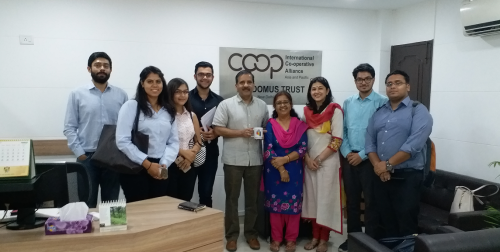Consultation on Co-operatives with youth-representatives in New Delhi

A group of students and teachers from the Jesus and Mary College (JMC) and the Shri Ram College of Commerce (SRCC) visited the Regional office on April 28 to discuss ways to enhance youth inclusion and participation in the co-operative sector. Balu Iyer, Regional Director began by asking the question – do youth need co-operatives or does the co-operative sector need more youth? The awareness among youth about the co-operative model is low and there is need for co-operatives to step up their outreach to youth. The students were shown the video – working together for a co-operative future produced by CICOPA and a presentation on the organizational structure of the ICA-AP and its recent work on youth inclusion in co-operatives. The discussion that followed touch on the character and scope of the co-operative sector and its practice in India and relevance of the model to youth. The students decided to work as an incubating group that will look poll students in their respective campuses, identify needs and come up with ideas to engage youth. The Partnership aims to develop co-operative development tools that can be applied in engaging youth in campuses.
GRI – CII Event to Mark the launch of SDG [Agenda 2030] - Focus on Partnerships in South Asia
At the inaugural event for the SDGs Agenda 2030 South Asia held on 27th April in New Delhi, the overarching theme was to find ways for businesses to contribute and help countries in achieving the SDGs. For ICA-AP, this was an important event vis-à-vis our ongoing project with the European Union, where we are focusing on making cooperatives agents of sustainable development. The event was jointly organized by GRI, South Asia and CII-ITC Centre of Excellence for Sustainable Development, aims to help define and promote the business contribution to SDGs; tackle the challenges of reporting on SDGs; and allow companies to demonstrate their leadership.
Since a core theme of the event was also on reporting data on sustainability by the corporates, the relevance of ‘big data’ and its essential requirement in any small or large scale program was reinforced. Apart from reliable data, Mr. Pietro Bertazzi, Deputy Director, GRI, spoke of the need for including and building on ‘collective local experiences’ of the countries in the South Asian context. Mr. Shantanu Roy from GAIL (India) Limited proposed an interesting phrase of ‘sustainability soldiers’, who labor through the process despite emerging with wounds of failure or other forms of resistance, which may distract us from our goal of sustainability. His Excellency Mr. Janis Björn Kanavin, Special Envoy for Responsible Business in Norwegian Ministry of Foreign Affairs, threw light on how it’s the medium and small businesses in any economy that build people’s lives and shape their surroundings. He spoke of the importance of recognizing the supply/value chain of businesses with the larger communities. His thoughts resonated quite well with us, as those are the core values of any cooperative business. Professor S. Peppin, Academic Dean of the Xavier School of Sustainability, Bhubaneswar, reminded everyone on importance of quality education on the goals, and the role of students and youth in achieving them. The panelists agreed on the private sector making sustainability interventions beginning at the school level if the youth were to be truly integrated in the process of reaching the goals. Co-operative enterprises and their network in south Asia are well positioned to contribute and report on activities positively affecting the SDGs. The Partnership and the recently concluded 10th Asia Pacific Co-operative Ministers’ Conference (Hanoi, Vietnam) give the ICA-AP and its members a unique opportunity to underscore the co-operative way of doing business that has ‘sustainability’ at its core.



